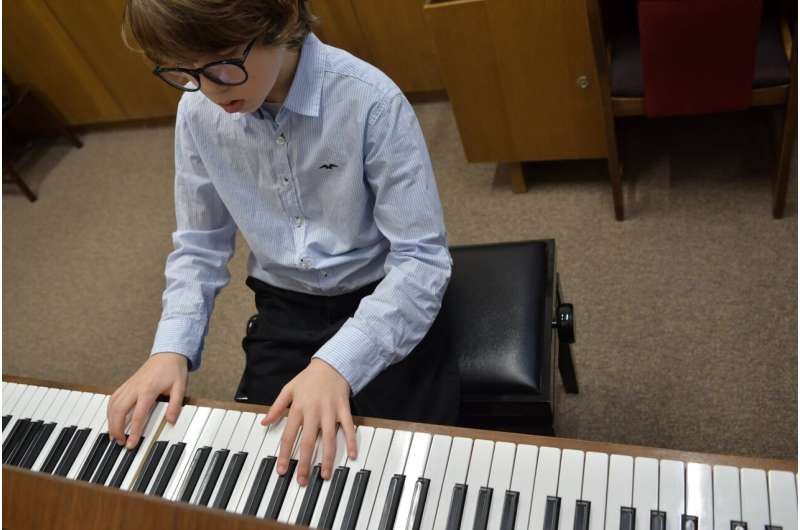This one simple trick can improve your musical performance

Music performance is enhanced when musicians concentrate on the sounds they make, not on the movements of their fingers, according to a study led by researchers at the University of St Andrews.
Dr. Ines Jentzsch and Yukiko Braun from the School of Psychology and Neuroscience studied the performance of 51 pianists and showed that the accuracy and the quality of a musical performance depended on what the musicians gave focus to while playing.
By concentrating on something external—such as achieving a smooth tone or creating a musical mood—instead of something internal such as concentrating on their fingers hitting the right notes, the pianists performed more accurately, providing an interesting insight that could help musicians learn how to overcome performance anxiety.
Participants in the musical study with at least intermediate piano playing skills were asked to practice a set piano piece for seven days and then perform it to the experimenter under different performance instructions. The researchers found that an external focus of attention resulted in more accurate performance compared to an internal focus instruction, as evaluated by the difference in the number of note pitch errors and note corrections.
Importantly, the study found that the advantage of external over internal focus of attention was the same regardless of the skill level of the pianist, meaning the findings could have an impact for music teaching practice and not just for musicians who perform for audiences.
Encouraging students to focus externally instead of on their own body movements might make it easier for them to carry out their well-rehearsed motor actions while also freeing up their capacity to concentrate on expressive and interpretative aspects of the music during performance, and could help reduce the impact of performance anxiety.
Already recognized as a highly effective tool in sports psychology, concentrating on the outcome of our actions—such as putting the ball in the back of the net—and not on the physical movements we make has a dramatic benefit for both the accuracy and the quality of performance.
Dr. Jentzsch said: "We face performance challenges in all areas of our lives, from public speaking to skilled sports and music performance. Many of us have experienced a public performance falling apart, even after perfection in practice. Our research suggests that a very simple tool—concentrating on the effects of our actions, not on the actions themselves—could be an effective way to improve music performance.
"It could be helpful for music teachers or coaches to help their students to improve performance or potentially even combat performance anxiety. For example, when commenting on a student's scale playing, a music teacher might, instead of commenting on hand position or thumb transitions, ask the student to focus on the smoothness of the produced sound."
The paper, "Effects of attention focus instructions on amateur piano performance," is published in Psychology of Music.
More information: Ines Jentzsch et al, Effects of attention focus instructions on amateur piano performance, Psychology of Music (2022). DOI: 10.1177/03057356221101431
Provided by University of St Andrews





















